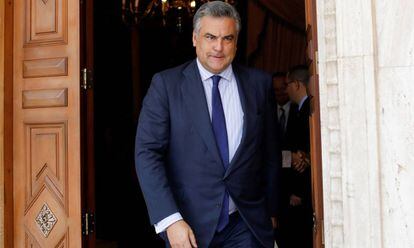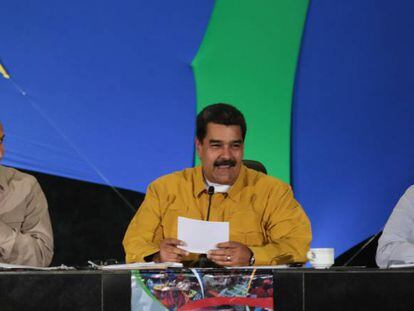Spain expels Venezuelan ambassador as crisis with Maduro deepens
The Cabinet decision comes in the wake of Caracas declaring Spain’s chief diplomat in the country persona non grata


The Spanish Cabinet decided on Friday to declare the Venezuelan ambassador in Spain, Mario Isea, persona non grata, “in strict reciprocity” after a decision on Thursday by the government of Nicolás Maduro to do the same, and expel the Spanish ambassador in Venezuela, Jesús Silva Fernández. The move was confirmed on Friday by government spokesperson Íñigo Méndez de Vigo after the weekly Cabinet meeting. The minister expressed his regret over the behavior of, and attacks launched by, Maduro in recent days against Spain, and in particular against Prime Minister Mariano Rajoy.
Declaring a diplomat persona non grata is as rare as it is serious, and is carried out very occasionally in the face of very serious political crises.
Declaring a diplomat persona non grata is as rare as it is serious, and is carried out very occasionally in very serious political crises
The Venezuelan government earlier this week had officially given the Spanish ambassador 72 hours to leave the country, after being declared persona non grata, according to sources from the Spanish Foreign Ministry. The decision made by the government of Nicolás Maduro was announced on Thursday by the Venezuelan foreign minister, Jorge Arreaza, via a statement released on Twitter.
The expulsion of the Spanish diplomat came two days after the Venezuelan executive recalled its ambassador in Madrid, Mario Isea, for consultation due to what it called the “interfering and colonialist aggression” of the Spanish government – a decision that was also announced via Twitter.
What’s more, Venezuela handed over a “blunt” protest letter to European Union (EU) diplomats due to the sanctions imposed against seven senior officials from the Caribbean nation.
The EU itself has firmly condemned the latest actions of the Maduro government, and has expressed its solidarity with Spain. “We express our full solidarity with Spain and we call for this decision to be reversed, given that it goes against the need to keep diplomatic channels open,” said on Friday Catherine Ray, the spokesperson for EU foreign affairs.
Caracas has blamed Spain, along with other countries, for the sanctions imposed on Monday against seven high-ranking officials of the Venezuelan government, among them Interior Minister Nëstor Reverol; Maduro’s right-hand man, Diosdado Cabello; and the president of the electoral authority, Tibisay Lucena.
Caracas has blamed Spain for the sanctions imposed on Monday against seven high-ranking officials of the Venezuelan government
The EU has accused them of “damaging democracy and the rule of law,” as well as “serious violations of human rights,” reducing the powers of the Venezuelan parliament, in which the opposition enjoys a majority.
The Venezuelan president has openly blamed growing international pressure on his country on the Spanish government. “The elite, the racist, colonialist oligarchy that governs Spain” was to blame, he said. “The most corrupt government that has ever been seen in the history of Spain is presided over by Mariano Rajoy,” he added.
From Davos, where he was attending the World Economic Forum, Spanish Foreign Minister Alfonso Dastis stated that Spain would respond “proportionally and with reciprocity” to Venezuela’s decision, and rejected accusations of “interference” launched by the Venezuelan government. Dastis stated that the only thing that Spain has done is to “help the process” of dialogue between the government of Nicolás Maduro and the opposition.
English version by Simon Hunter.

/cloudfront-eu-central-1.images.arcpublishing.com/prisa/5BHRQTJIKNDHBSAOPCTMHHNHEY.jpg)










































